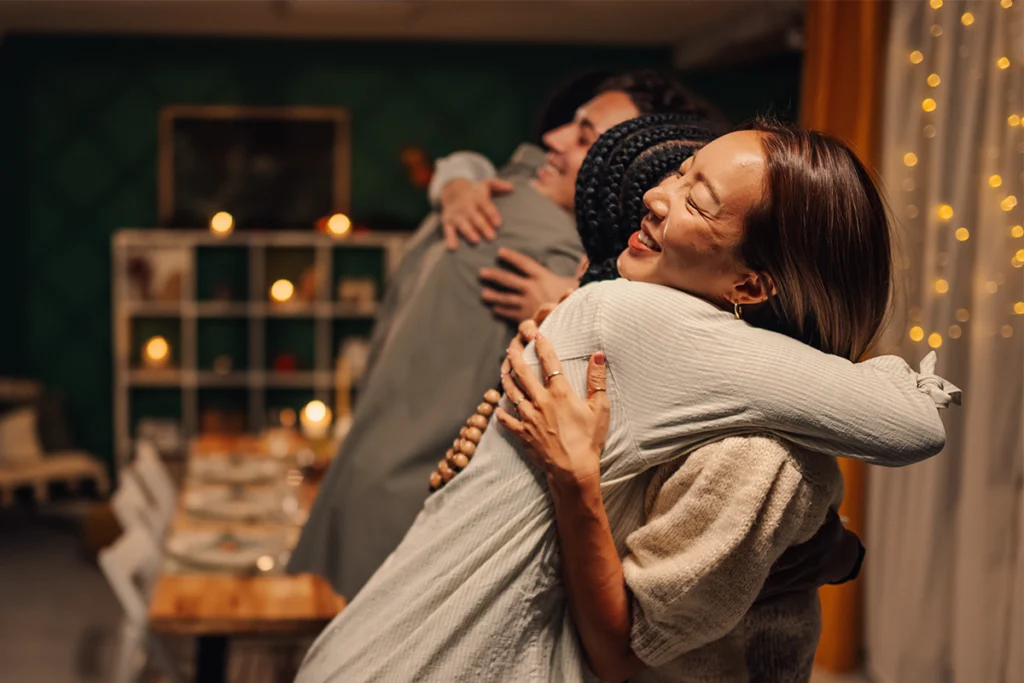“Giving my kids the basic facts, letting the girls take the lead on what details they wanted to know… felt comfortable.”
Navigating a cancer diagnosis is hard. Doing it while parenting young children can feel nearly impossible. The emotional weight, the medical logistics, the fear all becomes even more complex when you're trying to protect your kids while being honest with them.
One of the most difficult questions many parents face is: How, and when, do I tell my children?
Cancer Hope Network Peer Mentor Volunteer Robbie has been there. Diagnosed with breast cancer in 2005, she was parenting two young daughters, ages 9 and 7, when everything changed.
“When I was diagnosed with breast cancer in 2005, our girls were 9 (4th grade) and 7 (first grade). My biggest concern was not worrying them. I took many phone calls in my bathroom with the water running where I was sure I would have privacy. I limited who I told before I told my kids and anyone I told about my diagnosis I included, ‘When you see me with my girls around there will be absolutely no sad faces, tears, or looks of concern.’ Basically, I let people know in no uncertain terms that if they scared our kids, I’d never speak to them again. A well-meaning close friend sent me flowers after I told her of my diagnosis. I quickly hid the flowers in the attic so the kids wouldn’t see them.”
Robbie’s thoughtful approach balanced honesty with protection. Like many parents, she turned to trusted voices for guidance and ultimately followed her own instincts.
“After seeking advice on what to say to my girls, I settled on telling them only the truth and only what they could absorb. Some people suggested I not use the word ‘cancer’ but in the end I decided I wanted them to hear the word from me, not hear or overhear it from someone else. Once I knew that I was having surgery and that it would be followed by chemo, I chose to tell the kids. I didn’t have my husband there when I told them because I didn’t want to give it too much weight.”
She chose a moment that felt natural, sitting with her daughters at the kitchen table during snack time. The conversation was simple, honest, and filled with reassurance.
“I remember it very clearly. The girls were sitting in the kitchen having a snack in the afternoon and I told them I found out I had breast cancer and that the doctor said I would be fine and that I would need an operation and then some medicine that was going to make me feel yucky and look funny for a while. My older daughter said, ‘But mommy, millions of women die each year from breast cancer.’ My reply, ‘Not me. I will be fine, that’s why I’m having the operation and the medicine.’ She replied, ‘well then, we will have to do those fundraiser walks when you are done!”
Of course, the impact of a diagnosis doesn’t end with one conversation. It unfolds over time, in quiet moments and late-night fears. Robbie’s younger daughter had her own emotional response later that evening.
“That night, my younger daughter got out of the shower crying and said ‘mommy, I wish this were just a bad dream.’ I reassured her that I would be okay and that she could ask me anything she wanted anytime.”
Robbie also reached out to her daughters’ teachers, making sure the school community was informed and empowered to help if needed while gently reinforcing her boundaries.
“Once I let the girls know, I contacted their teachers to let them know (reiterating my ‘no sad face rule’) and asking them to please let me know if they saw any signs of distress or distraction at school.”
Every family’s experience is unique. What worked for Robbie and her girls may offer ideas or comfort, but there’s no one-size-fits-all approach. That’s where connection comes in.
If you or someone you love is parenting through a cancer diagnosis, Cancer Hope Network can help. Peer Mentors have walked this path and they’re here to listen, share, and support. All matches are free, confidential, and scheduled at a time that works for you (yes, even during nap time).
To speak with a Cancer Hope Network Peer Mentor like Robbie or someone with a similar parenting journey, visit www.cancerhopenetwork.org. You don’t have to do this alone.
